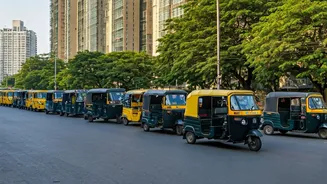Disruptions Unveiled
Today's situation in Mumbai has brought forth significant challenges for auto and taxi services, directly impacting the daily lives of countless commuters.
Various factors appear to be contributing to these disruptions, including labor issues, operational difficulties, and possibly regulatory changes. These multiple elements have collectively created a complex scenario, resulting in service limitations and increased challenges for those relying on these essential modes of transport. The ongoing situation requires immediate attention and thoughtful analysis to grasp its full impact on Mumbai's transportation network. Understanding these elements will assist stakeholders, including commuters, service providers, and authorities, to better manage the situation and develop more effective solutions.
Understanding the Causes
The recent difficulties experienced by Mumbai's auto and taxi services appear to stem from multiple key factors. One major concern is the ongoing labor unrest, with drivers frequently voicing grievances about pay, working conditions, and fare structures. Another component involves operational challenges, such as the increasing cost of fuel, vehicle maintenance expenses, and the intense competition from app-based ride services. Furthermore, regulatory modifications, possibly impacting permit rules and operational protocols, may contribute to the difficulties. These various elements converge, creating an environment where the service providers struggle to maintain operations and offer consistent service, thereby affecting commuters and the overall transportation ecosystem within the city. Examining the complex web of causes is vital to devising efficient strategies for resolving these issues.
Impact on Commuters
The disruptions to auto and taxi services in Mumbai have notably affected the daily routines of numerous commuters. The limited availability of autos and taxis means longer wait times, which can cause significant delays in journeys and possibly lead to missed appointments or altered work schedules. Increased fares resulting from reduced supply may intensify the financial strain on the public, particularly those who rely on these services for daily transit. Moreover, the uncertainty linked to the availability of autos and taxis adds to the general commuting stress. This situation emphasizes the crucial role these services play in supporting the city's economy and social activity, making the effects of disruptions widely felt and significant for individuals across Mumbai.
Possible Solutions and Outlook
Addressing the challenges faced by Mumbai's auto and taxi services necessitates a comprehensive strategy. The resolution might include facilitating constructive dialogues between drivers, service providers, and regulatory bodies to address concerns such as earnings, operational expenses, and regulatory compliance. Streamlining operational models by embracing technological improvements may improve efficiency and customer experience. Also, revisions to fare structures that fairly account for operating expenses and driver wages may prove crucial. The long-term perspective requires innovative, practical and sustainable solutions to strengthen the resilience and reliability of Mumbai's transportation infrastructure, securing its vital position within the city. This would improve the commuting experience of citizens.





















